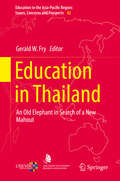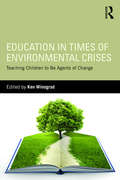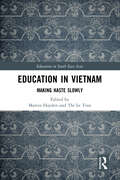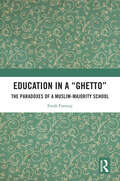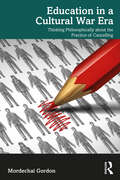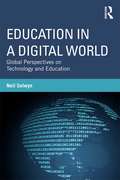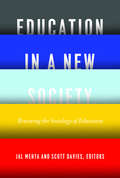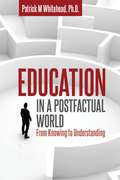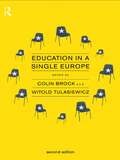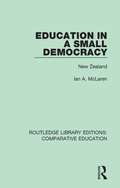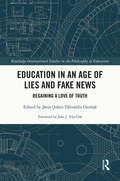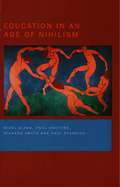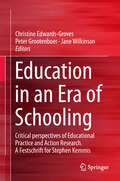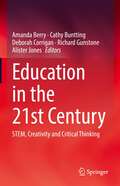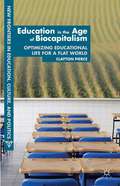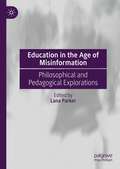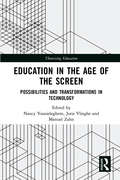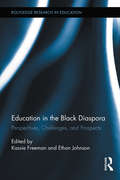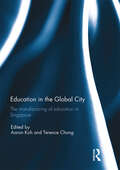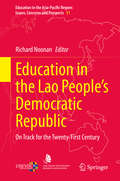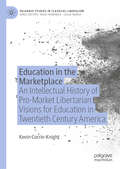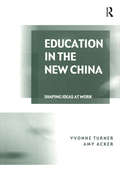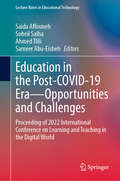- Table View
- List View
Education in Thailand: An Old Elephant In Search Of A New Mahout (Education in the Asia-Pacific Region: Issues, Concerns and Prospects #42)
by Gerald W. FryThis interdisciplinary book offers a critical analysis of Thai education and its evolution, providing diverse perspectives and theoretical frameworks. In the past five decades Thailand has seen impressive economic success and it is now a middle-income country that provides development assistance to poorer countries. However, educational and social development have lagged considerably behind itsglobally recognized economic success. This comprehensive book covers each level of education, such as higher and vocational/technical education, and such topics as internationalization, inequalities and disparities, alternative education, non-formal and informal education, multilingual education, educational policy and planning, and educational assessment. The 25 Thai and 8 international contributors to the volume include well-known academics and practitioners. Thai education involves numerous paradoxes, which are identified and explained. While Thailand has impressively expanded its educational system quantitatively with much massification, quality problems persist at all levels. As such, the final policy-oriented summary chapter suggests strategies to enable Thailand to escape “the middle income trap” and enhance the quality of its education to ensure its long-term developmental success.
Education in Times of Environmental Crises: Teaching Children to Be Agents of Change
by Ken WinogradThe core assumption of this book is the interconnectedness of humans and nature, and that the future of the planet depends on humans’ recognition and care for this interconnectedness. This comprehensive resource supports the work of pre-service and practicing elementary teachers as they teach their students to be part of the world as engaged citizens, advocates for social and ecological justice. Challenging readers to more explicitly address current environmental issues with students in their classrooms, the book presents a diverse set of topics from a variety of perspectives. Its broad social/cultural perspective emphasizes that social and ecological justice are interrelated. Coverage includes descriptions of environmental education pedagogies such as nature-based experiences and place-based studies; peace-education practices; children doing environmental activism; and teachers supporting children emotionally in times of climate disruption and tumult. The pedagogies described invite student engagement and action in the public sphere. Children are represented as ‘agents of change’ engaged in social and environmental issues and problems through their actions both local and global.
Education in Vietnam: Making Haste Slowly (Education in South East Asia)
by Martin Hayden Thi Le TranOffering insights into the current and projected future state of the education system in Vietnam, this edited volume is an authoritative sourcebook for scholars, policy analysts, academic staff, and students.Vietnam is well on its way to joining the dress circle of high-achieving education nations in Asia. International surveys of the academic aptitude and ability of the nation’s youth consistently place it well above relevant regional and global averages. This accomplishment is remarkable for a country with a gross domestic product per capita of only US$2,785 in 2020. The dynamics of Vietnam’s national education system are comprehensively documented in the book. Each of the country’s education sectors is critically appraised as well as the culture of education in Vietnam. Specific issues concerning funding and equity, quality and accreditation, the teaching of curriculum areas, the internationalisation of the system, and the provision of educational opportunities for young people with disabilities are carefully analysed against a background of relevant global trends.With contributions from well-established and highly respected local experts with high aspirations for the future development of the national education system in Vietnam, this book will be a must-read for academics and students of Southeast Asian studies and comparative education.
Education in Youth Detention Homes: An Ethnographic Study of Schooling Against the Odds (Routledge Frontiers of Criminal Justice)
by David WästerforsDrawing upon meticulous ethnographic analysis and unique data sources, this book dissects the multifaceted challenges and occasional victories encountered by both educators and detained youth in Sweden.Originally published in Swedish, this book provides fresh insights into a crucial aspect of youth care and education. Theoretical underpinnings draw from ethnomethodology’s focus on members’ accounts, complemented by C. Wright Mills’ framework of motives and Erving Goffman’s seminal studies on total institutions. The book also includes seven practical suggestions directed to teachers, but also to pupils, treatment staff, and institutional managers, that aim for translating analytical insights into everyday practice.Education in Youth Detention Homes will be of interest to researchers and students in criminology, sociology, social anthropology, and social work, as well as to professionals in the field of education for young people at risk of crime, psychosocial problems, and social exclusion.
Education in a 'Ghetto': The Paradoxes of a Muslim-Majority School
by Farah FarooqiThis book explores the structures of power and politics within a government-aided school situated in a Muslim-majority area in Delhi, India. It provides a look into how teachers, administrators and students in low-income and disadvantaged communities navigate limited opportunities and resources. The book discusses the socio-economic and cultural background of students, institutional rituals and practices and the impact of power relations on the students. It critiques the power and privilege of those in positions of authority in the school and showcases how bureaucratic systems in state run schools often do not consider the circumstances and interests of students and often hinder their growth. This book will be of interest to students of education, sociology, development studies, political science and social work. It will also be useful to educationalists, sociologists, political scientists, NGOs and those interested in the interface of state, society and education.
Education in a Cultural War Era: Thinking Philosophically about the Practice of Cancelling
by Mordechai GordonIn the past couple of years, much has been said and written in the media about the notion of ‘cancel culture’ and the way in which various celebrities, journalists, politicians, ideas, and monuments have been cancelled. Yet, the conversations taking place on this issue have been largely uninformed, lacking intellectual rigor, and devoid of the historical and cultural context that could help make the contested debates more enlightening. The author investigates the phenomenon of cancelling historically as well as how it became an issue recently. The book presents some compelling philosophical arguments against the practice of cancelling and highlights various educational dangers and risks that emerge from this practice and deserve our attention.
Education in a Digital World: Global Perspectives on Technology and Education
by Neil SelwynDrawing on a wealth of theoretical and empirical work, Education in a Digital World tackles a number of pressing questions, such as, how are ‘global’ trends in educational technology refracted through national policies and processes? How exactly are educational technologies linked to issues of global economics and the fortunes of national and international economies? To what extent are digital technologies implicated in the commercialisation, marketization and commodification of education? These questions, and others, are addressed throughout eight wide-ranging chapters, which consider topics such as the national policy strategies of countries across North and South America, Europe and East Asia, the educational technology portfolios of international organizations such as the United Nations and Microsoft, as well as the role of education and technology in international development and the on-going efforts to provide ‘one laptop per child’ across low-income regions and countries. Through these examples Selwyn develops a detailed analysis of education, technology and globalisation, drawing together arguments and debates from various academic perspectives. Written in a detailed but accessible manner, this is an essential book for anyone wishing to gain a better understanding of the role of education and technology in contemporary globalised society.
Education in a New Society: Renewing the Sociology of Education
by Jal Mehta Scott DaviesIn recent decades, sociology of education has been dominated by quantitative analyses of race, class, and gender gaps in educational achievement. And while there’s no question that such work is important, it leaves a lot of other fruitful areas of inquiry unstudied. This book takes that problem seriously, considering the way the field has developed since the 1960s and arguing powerfully for its renewal. The sociology of education, the contributors show, largely works with themes, concepts, and theories that were generated decades ago, even as both the actual world of education and the discipline of sociology have changed considerably. The moment has come, they argue, to break free of the past and begin asking new questions and developing new programs of empirical study. Both rallying cry and road map, Education in a New Society will galvanize the field.
Education in a Postfactual World: From Knowing to Understanding
by Patrick M. WhiteheadIn this book, Whitehead argues against the fact-minded orientation of education and the practice of science. It is not that facts are unhelpful, but they have become a substitute for learning (learning is now tantamount to fact memorization). This change handicaps students by eliminating the possibility of creativity, curiosity, and critical thinking; it handicaps science by limiting the kinds of questions that can be asked and where to look for answers; and ultimately puts people out of touch with their experience.°The problem is fact-mindedness. Facts are the relics of enlightenment thinking. They represent unbiased and unquestionable truth about our universe. The more you collect, the more you know; the more you know, the more powerful you are; the more powerful you are…. You get the picture.°It is a familiar theme from the middle of this past century, and has been described by contemporary physicists, theoretical biologists, continental philosophers, humanistic psychologists, learner-centered teachers, among many, many others. Unfortunately, college students are seldom exposed to these ideas, and have to wait until they reach graduate school before they wonder if their learning experience may have been different. The goal is to make those ideas accessible here by translating the cumbersome, obscure, and turgid expression of these ideas into twenty-first century examples that are more applicable and meaningful for undergraduates and the educated public.°It is argued that judgment must always be applied to matters of fact. That is to say, the fact is not the end of the story. That gravity compels bodies does not substantiate itself: it is a way of describing the relationships between bodies. Gravity helps us better understand physical relationships, but by itself and outside of any meaningful context that fact of gravity is useless.
Education in a Single Europe
by Colin Brock Witold TulasiewiczThis book brings together contributors from the different member states of the European Union in order to understand the different degrees of subscription to the concept of Europe and the role education plays in such a process. This second edition includes the new countries which have become part of the union and also considers recent developments in policy and practice. Countries covered are: Austria; Belgium; Denmark; Finland; France; Germany; Greece; Ireland; Italy; Luxembourg; Netherlands; Portugal; Spain; Sweden and the UK. All sectors of education are dealt with in each case and the central theme of the European dimension is examined throughout.
Education in a Small Democracy: New Zealand (Routledge Library Editions: Comparative Education)
by Ian A. MclarenOriginally published in 1974. Here is a detailed discussion of educational change in New Zealand with implications which should provoke a fresh approach both to the educational tradition in Britain and to the problems of other educational systems which are subject to democratic control. It is primarily concerned with developments in the quarter-century between 1945 and 1970. With frequent reference to events preceding and following this period, the author stresses throughout the professed educational ideal of all post-war New Zealand governments: to provide equality of opportunity in education. He deals with principles of policy and administrative control, including the universities and estimates the influence on official policy of interest groups inside and outside the educational system. He examines social issues which include the extent to which governments have failed to promote equality of opportunity in the schooling of minority groups in the country, and treats, in an historical perspective, the perennial vexed question of state aid to private schools. The concluding chapters describe and analyse the characteristics, difficulties and prospects of primary, secondary and tertiary education.
Education in an Age of Lies and Fake News: Regaining a Love of Truth (Routledge International Studies in the Philosophy of Education)
by Jānis John Tālivaldis Ozoliņš João J. Vila-ChãThe ‘post-truth’ world in which we live has been beset by fake news, lies and a cavalier disregard for truth. If truth is neglected then an alternative is an appeal to the emotions in order to validate a particular position, which can quickly turn to the use of power to impose a particular view. The loss of truth results in the loss of freedom. This book contends that if we want to preserve our freedom then we have a serious obligation to pursue truth. One way to do this is through an adequate moral education. Education in an Age of Lies and Fake News: Regaining a Love of Truth makes an argument for the importance of truth. It explores how we can retrieve the concept of truth and how moral education can be deployed in order to re-establish a commitment to truth. It introduces Eastern perspectives on the question of truth and how we view reality, and presents a realist position on the nature of truth as a counter to scepticism, drawing on Augustine and Thomas Aquinas, amongst others. Further, the chapters are mindful of the significance of developing a pedagogy which not only enables students to be critical thinkers, but to foster a genuine concern for truth and for its pursuit. This book will be essential reading for students, educators, philosophers and researchers pursuing the question of truth in the modern age.
Education in an Age of Nihilism: Education and Moral Standards
by Richard Smith Paul Smeyers Paul Standish Nigel BlakeThis book addresses concerns about educational and moral standards in a world increasingly characterised by nihilism. On the one hand there is widespread anxiety that standards are falling; on the other, new machinery of accountability and inspection to show that they are not. The authors in this book state that we cannot avoid nihilism if we are simply laissez-faire about values, neither can we reduce them to standards of performance, nor must we return to traditional values. They state that we need to create a new set of values based on a critical assessment of contemporary practice in the light of a number of philosophical texts that address the question of nihilism, including the work of Nietzsche.
Education in an Era of Schooling: Critical Perspectives Of Educational Practice And Action Research. A Festschrift For Stephen Kemmis
by Peter Grootenboer Jane Wilkinson Christine Edwards-GrovesThis book is a Festschrift for Emeritus Professor Stephen Kemmis, who has a long and eminent career as an educational researcher and academic spanning over 40 years. His work in curriculum, evaluation, critical practice, action research and practice theory has been influential across all continents of the world.The book examines critical perspectives on educational practice and the participatory nature of action research, including practitioner research particularly as undertaken by teachers in schools. Including vignettes from Kemmis’ colleagues and mentors, it draws on contributions from a range of academics whose scholarship has been inspired, influenced and initiated by his work. The chapters stem from a range of countries, including Australia, Canada, Finland, weden, the United Kingdom, United States of America, and Trinidad and Tobago - a testimony to the enduring and global legacy of Kemmis’ scholarship. Contributing authors include leading educational research scholars, indigenous elders from Australia, and community leaders concerned with environmental sustainability.The concluding focus of this book turns towards practice theory. Kemmis’ later work led to the development of the theory of practice architectures and gave rise to the development of the theory of ecologies of practices in education. Research drawing on the theory of practice architectures and ecologies of practices resulted in the leading text “Changing practices, changing education” (Kemmis, Wilkinson, Edwards-Groves, Hardy, Grootenboer & Bristol, 2014, Springer) that reports on an Australian investigation of the ecological relationship between student learning, teaching, professional learning, leading and researching practices.This theory is now being applied to study practices across a wide range of international contexts, sites and disciplines including early childhood, school education, university education, vocational education and training, community environment, indigenous cultural sustainability and health.
Education in the 21st Century: STEM, Creativity and Critical Thinking
by Amanda Berry Alister Jones Cathy Buntting Deborah Corrigan Richard GunstoneThis book explores a range of issues central to STEM and 21st Century education. It explores research into the relationships between creativity, critical thinking and STEM Education from both a theoretical and practical perspective. It examines matters associated with three main concerns: First is the ways some research and development that is labelled “STEM” appears to be essentially one of the specific individual components, S, T, E or M, with a new label rather than something going across and/or beyond these more traditional components. The second, at times intertwining, concern is the common ways in which school curriculum continues to hold separate disciplines as its core. The third concern is that while cross-curriculum goals are increasingly common in this century - particularly for “creativity” and “critical thinking” - it is also common that the goals remain only vaguely linked with the more usual components of the whole curriculum. This book reflects on all three of these important concerns and the integrated whole that can result from them. Monash University, King’s College London and Waikato University have now generated six edited books on successive related research issues of significance to contemporary science education. Each of these books has been substantially shaped by a writing workshop involving all authors in intensive discussion about drafts of their contributions (a process of great worth in its own right, as well as for enhancing the value of the final volume), and then each author reworking the contribution in the light of the discussions The seventh will extend beyond science education and explore a range of issues central to STEM and 21st Century education.
Education in the Age of Biocapitalism
by Clayton Pierce"This book is an in-depth examination of the growing alignment between powerful global bioindustries and education reform in the U. S. Utilizing a biopolitical methodology, the book focuses on how value-added measures and other neoliberal strategies embedded in policies such as 'race to the top' are involving schools in a project to manage and regulate educational life for competing in a new 'flat world'. Understanding the educational present, this work argues, requires individuals to consider what advanced industrialized nations across the globe are viewing as the future. Biocapitalist development in areas such as genetic engineering, drug therapies, and cellular cloning is the promissory future driving nations like the U. S. to out-compete and out-educate one another at any cost. This book assesses the implications for education in the biocapitalist era and points to alternative futures not based on such a vision of life and its productive potential"--
Education in the Age of Misinformation: Philosophical and Pedagogical Explorations
by Lana ParkerThis edited volume examines the implications of misinformation and youth digital life in a new information environment. This new information environment is characterized by high levels of user engagement, hidden algorithmic manipulations, and information abundance, including misinformation and disinformation. While misinformation and disinformation in the post-truth era have been previously investigated, this edited volume offers a distinctive educational focus that scholars have not yet addressed. Chapters contribute to the ongoing discussion of the role of education in democracies while uniquely contextualizing the problem of misinformation as a pedagogical opportunity. Contributions from across the globe answer the question of how education might respond to the changing information environment through engagements with educational philosophy, democracy, and everyday practices of teaching and learning. The book adds to a growing body of work exploring what it means to engage in responsive, rather than reactive or stagnant, pedagogy.
Education in the Age of the Screen: Possibilities and Transformations in Technology (Theorizing Education)
This edited volume brings together experts from across the field of education to explore how traditional pedagogic and didactic forms and processes are changing, or even disappearing, as a result of new technologies being used for education and learning. Considering the use, opportunites and limitations of technologies including interactive whiteboards, tablets, smart phones, search engines and social media platforms, chapters draw on primary and secondary research to illustrate the wide-reaching and often salient changes which new digital technologies are introducing into educational environments and learning practices around the world. Neither claiming that traditional forms of learning must be replaced, nor calling for a restoration of the school, Education in the Age of the Screen offers a nuanced exploration of the implications of digitization for education. Taking a broad view on education as a social and cultural phenomenon, the volume focuses on three major dimensions: the wider conditions against the background of which we educate and are educated today, detailed examples of aesthetic practices and educational initiatives in the current media culture, and concrete answers to the challenges that come our way. A comprehensive and timely consideration of the state of education in the digital age, this will be of interest to researchers, academics and post-graduate students in the fields of education and pedagogy, media and cultural studies, as well as teacher educators and trainee teachers.
Education in the Best Interests of the Child
by R. Brian Howe Katherine CovellA large body of research in disciplines from sociology and policy studies to neuroscience and educational psychology has confirmed that socioeconomic status remains the most powerful influence on children's educational outcomes. Socially disadvantaged children around the world disproportionately suffer from lower levels of educational achievement, which in turn leads to unfavourable long-term outcomes in employment and health. Education in the Best Interests of the Child addresses this persistent problem, which violates not only the principle of equal educational opportunity, but also the broader principle of the best interests of the child as called for in the UN Convention on the Rights of the Child.Building on the children's rights work accomplished in their previous book, Empowering Children, Brian Howe and Katherine Covell identify three types of reform that can significantly close the educational achievement gap. Their findings make an important argument for stronger and more comprehensive action to equalize educational opportunities for disadvantaged children.
Education in the Black Diaspora: Perspectives, Challenges, and Prospects (Routledge Research in Education)
by Kassie Freeman Ethan JohnsonThis volume gathers scholars from around the world in a comparative approach to the various educational struggles of people of African descent, advancing the search for solutions and bringing to light new facets of the experiences of black people in the era of globalization.
Education in the Global City: The manufacturing of education in Singapore
by Aaron Koh Terence ChongEducation in the Global City examines education in Singapore through the critical lens of ‘manufacturing’. The book brings together two disparate fields which inform each other, education and the ‘global city’; and the book’s contributors analyse and critique the manufacturing of Singapore education and Singapore’s global city formation. The collection covers vocational education, language policies, Higher Education, English education, critical thinking, sex education, creativity, and critical feminist scholarship.Collectively, the book pries open the ideology of the manufacturing education system, and points out the tension between the nation and its ideologies, and the ‘global city’ aspirations. It also asks how education contributes to, and is shaped by, the market realities of Singapore’s global city ambitions – which are at odds with the nationalistic local agenda and priorities of nation-building. In interrupting and speaking against the prevailing (and narrow) manufacturing of education for a teleological end, in spite of Singapore’s successful nation-building, this book is an important contribution to critical education scholarship.This book was originally published as a special issue of Discourse: Studies in the Cultural Politics of Education.
Education in the Lao People’s Democratic Republic: On Track for the Twenty-First Century (Education in the Asia-Pacific Region: Issues, Concerns and Prospects #51)
by Richard NoonanThis book provides a comprehensive and in-depth description of the education system in Lao PDR. It covers pre-school, primary, secondary general, secondary technical and vocational, post-secondary non-higher education, and adult non-formal education and training. In addition to the main content, the book includes a glossary of terms and abbreviations used; and an appendix on the organizational structure of the Ministry of Education and Sports, including the linkages between the national, provincial and district level. The content covers public and private sector education provision alike.
Education in the Marketplace: An Intellectual History of Pro-Market Libertarian Visions for Education in Twentieth Century America (Palgrave Studies in Classical Liberalism)
by Kevin Currie-KnightThis book offers an intellectual history of the libertarian case for markets in education. Currie-Knight tracks the diverse and evolving arguments libertarians have made, with each chapter devoted to a different libertarian thinker, their reasoning and their impact. What are the issues libertarians have had with state-controlled public schooling? What have been the libertarian voices on the benefits of markets in education? How have these thinkers interacted with law and policy? All of these questions are considered in this important text for those interested in debates over market mechanisms in education and those who are keen to understand how those arguments have changed over time.
Education in the New China: Shaping Ideas at Work
by Yvonne Turner Amy AckerThe effects of the de-regulation of the Chinese university system have been nothing short of spectacular. For the first time since 1949, students possessing neither gifted intellect nor political connections have been able to share in the benefits of higher education, while a flood of international educators have opened up a previously cloistered and politically sensitized academic world. This fascinating book examines China’s higher education system, and how it’s new and unique blend of foreign and Chinese perspectives impact on both the lives of students and academics and wider Chinese society. Viewed with suspicion as a new type of Chinese by the older generation and by the government, they are at the same time the very entrepreneurs driving the economic and social revolution sweeping the country. Using a range of in-depth interviews and unique research, it provides open and often frank accounts of life, work and education in China, from the Cultural Revolution to the creation of its market-focused entrepreneurial generation. Candid and illuminating, this is a book no serious reader of Asian studies, comparative education or Asian sociology will want to be without.
Education in the Post-COVID-19 Era—Opportunities and Challenges: Proceeding of 2022 International Conference on Learning and Teaching in the Digital World (Lecture Notes in Educational Technology)
by Ahmed Tlili Saida Affouneh Soheil Salha Sameer Abu-EishehThis book offers authors’ practices, initiatives, and experiences in sustaining their education during the pandemic from different countries, contexts, and political situations. It provides a future prediction for the education system in the world due to the transformation that happened in the post-COVID-19 era. Each chapter of the book is expected to shed light on different countries describing their education system in the past, present, and future. The readers of the book will be able to learn, compare, and analyze the differences and similarities between the educations offered to learners around the world.The book also presents a new model of e-learning that will help learners, teachers, and educational systems to participate in achieving sustainable development goals. The book introduces several scenarios of types of learning and how to plan, design, and implement them in F2F and online environments.
